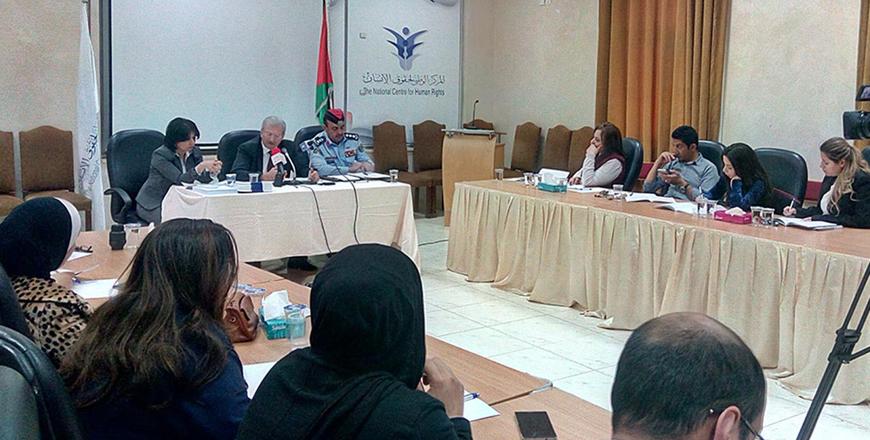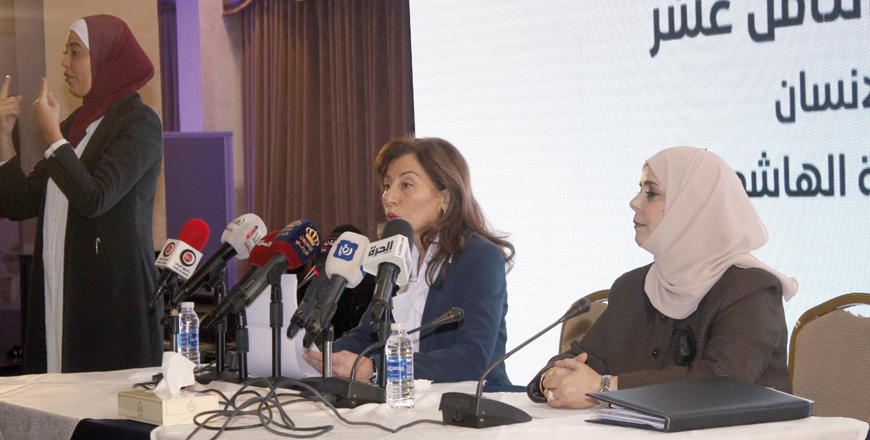You are here
Report sheds light on ‘torture, excessive force’ in detention
By Laila Azzeh - Apr 11,2017 - Last updated at Apr 11,2017

Acting human rights commissioner at the National Centre for Human Rights (NCHR), Nisreen Zreiqat, NCHR Chief Commissioner Mousa Breizat and head of the Public Security Department's transparency and human rights unit, Col. Hussam Majali announce the publication of a report into conditions in detention centres on Monday in Amman (Petra photo)
AMMAN – A report on the conditions in temporary detention centres was released on Monday, outlining the recurrence of late-night security raids, and the "excessive" use of force during arrests.
Conducted by the National Centre for Human Rights (NCHR), in cooperation with the Public Security Department's (PSD) transparency and human rights' unit, the report also indicated that individuals held in temporary detention are not allowed to seek the help of a lawyer.
"Jordanian law does not give suspects the right to hire a lawyer before the trial, or the preliminary interrogations, giving the judicial police the authority to interrogate the defendant in the early stage without a lawyer," said Mousa Breizat, the centre’s chief commissioner, quoting the report.
The report stated that the initial investigations' period sometimes extends for "long periods of time", based on the administrative detention memorandums issued by the district governors.
Under the current law, temporary detainees can be held for a period of 24 hours in detention rooms, but the judicial police at the station have the authority to arrest the suspects for a whole week, especially when the case involves terrorism, espionage, treason, drugs and counterfeit money, the study pointed out.
In 2016, shortage in meals, mattresses and bedcovers in detention rooms were recorded, while claims of torture, beating and inhumane treatment during the initial stage of interrogation were reported by detainees.
"However, torture and ill-treatment claims are not easy to determine, especially since they require immediate action from the side of the victim to document the occurrence," the report noted.
The NCHR received 63 cases of torture and mistreatment filed against some security departments and police officer last year, of which three were held pending at the claimant's request, 20 closed for lack of evidence, 43 still being investigated and three referred to the Police Court, the report indicated.
"It is very regrettable that torture cases are referred to the Police Court in the presence of serious criminal allegations, such as battering that led to death and disobedience of orders and instructions," the report stated, adding “only three torture cases were referred to the court over the last six years and they have not been ruled on to date".
"We, at the NCHR, believe that any case of suspected torture should be referred to a regular court rather than to a police court," Breizat said during a press conference on Monday, calling for the activation of Article 208 of the Penal Code, relating to the legal definition of torture.
Head of the PSD transparency and human rights unit, Col. Hussam Majali agreed that long litigation periods hinder justice, but he underlined the difficulty of ruling on such cases.
The report highlighted that prolonging litigation in cases of torture makes it harder to decide on, as it leads to the disappearance of signs of physical abuse and the inability to identify the perpetrator.
As for the physical environment of the detention rooms, the report, based on visits to 60 facilities across Jordan, also noted issues of poor sanitation and decrepit premises in some centres.
Facilities also lack a classification system to protect detainees' safety, only separating adult men from women and juveniles.
On the other hand, the report, based on 127 sudden and pre-arranged visits, showed "significant" progress in the overall situation of detention centres compared to previous years.
"The NCHR noticed that the PSD has been taking very positive steps to improve the conditions of rehabilitation and correctional centres over the past three years, and has worked to bring detention facilities in line with international standards the NCHR chief-commissioner said.
Acting human rights commissioner at the centre, Nisreen Zreiqat, who supervised the report, noted that the NCHR now urges the PSD to eliminate all violations committed by members of security departments and to refer them to court for legal action.
The recommendations also included modernising detention areas in police stations, improving the inspection process of these facilities, expediting the litigation process and referring cases of torture to a civil court rather than a police court, which “do not guarantee a fair trial”.
Majali noted that the PSD will "take the recommendations as they are", saying that the department received the report through the Cabinet and Interior Ministry, and had formed a committee to start taking necessary measures.
Related Articles
AMMAN — A gathering of government and civil society representatives in Geneva, Switzerland, on Friday will review the progress of torture pr
AMMAN — The National Centre for Human Rights (NCHR) on Monday said that it had received over 100 claims of torture and cruel treatment at th
AMMAN — The National Centre for Human Rights (NCHR) on Wednesday published its 18th annual report on the state of human rights in the Kingdo












